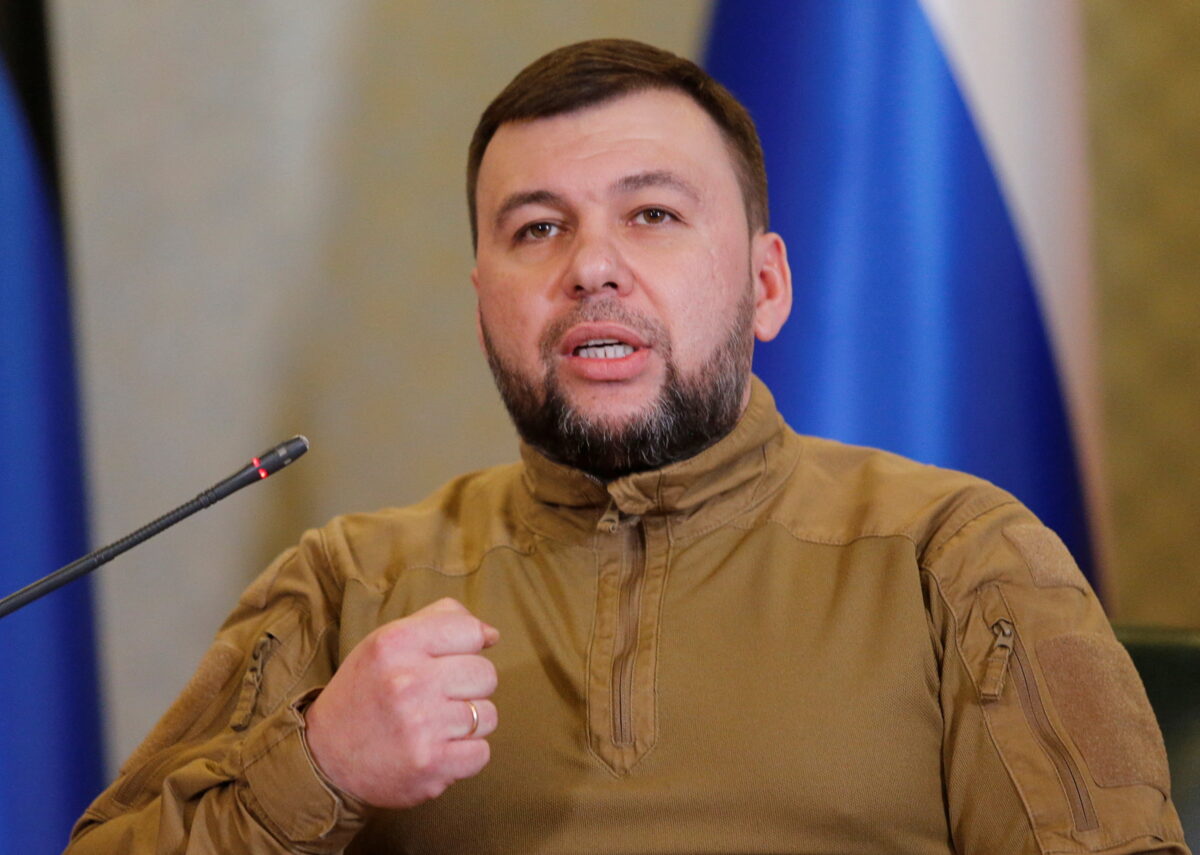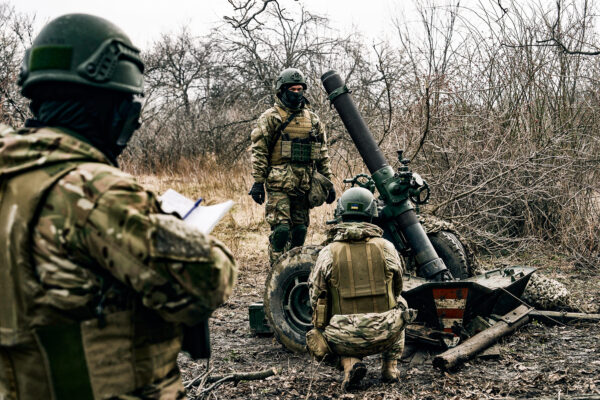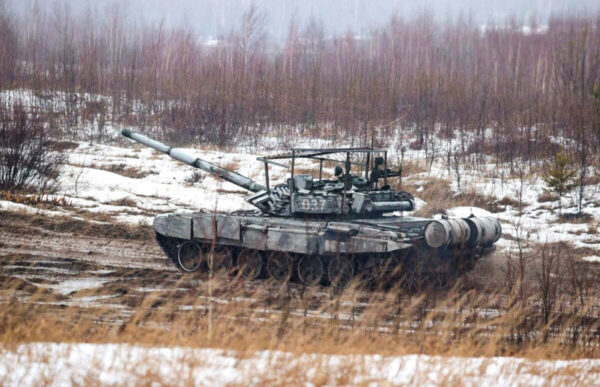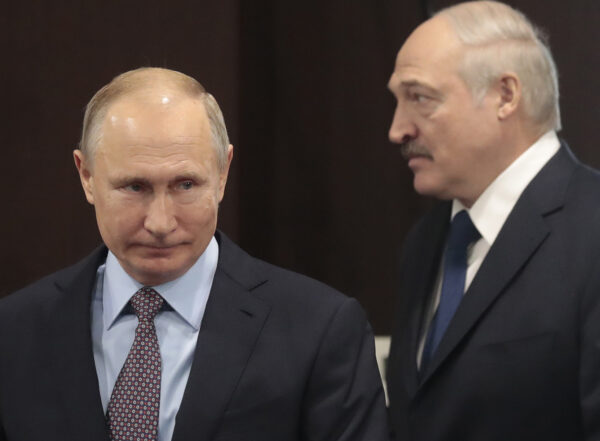


Belarusian President Alexander Lukashenko met with the head of the Moscow-backed Donetsk People’s Republic (DPR), drawing spirited protests from Ukrainian officials.
Kyiv and its Western allies reject the legitimacy of the DPR and view the Donetsk region as a Russian-occupied territory.
In a statement, Ukraine’s foreign ministry condemned the meeting between Lukashenko and DPR head Denis Pushilin, which was held in Minsk on April 18.
The ministry described the meeting as “an attempt to legitimize the representative of the Russian occupation administration in Donetsk.”
Unlike most Western capitals, Belarus—a key Russian ally—maintains relations with the DPR and the neighboring Moscow-backed Luhansk People’s Republic.
Last September, Russia effectively annexed the Ukrainian provinces of Kherson, Zaporizhzhia, Donetsk, and Luhansk after holding controversial referendums.
Moscow views the latter two provinces, which together comprise the Russian-speaking Donbas region, as “people’s republics.”
Kyiv and its allies refuse to recognize the annexations—and the Moscow-backed “people’s republics”—and demand that Russia relinquish all seized territories.
At the meeting, Lukashenko told Pushilin that Belarus sought to help the people of Donetsk and assist in the war-battered region’s reconstruction.
It was the first meeting between the two leaders since last year’s controversial annexations by Russia.
Donetsk remains the scene of fierce fighting between Ukrainian and Russian forces, especially in and around the flashpoint cities of Bakhmut and Avdiivka.
Russian regular forces have fought alongside the self-styled Donetsk People’s Militia, a local paramilitary group that supports the region’s integration into the Russian Federation.
“The combat is very intense there [in Donetsk],” Lukashenko told Pushilin during the meeting.
According to Belarusian news agency BelTA, Lukashenko voiced his country’s readiness to “provide assistance and support” to the people of Donetsk “so that our kinfolk finally stop suffering.”
The two leaders also reportedly discussed means of bolstering trade ties between Belarus and the Russia-controlled region.
Speaking on Telegram after the meeting, Pushilin confirmed that he and Lukashenko had discussed “mutually beneficial cooperation between our region and the Republic of Belarus.”
He went on to assert that the DPR hoped to step up bilateral cooperation with Minsk, especially in the fields of agriculture, industry, and construction.
According to Pushilin, the DPR seeks to obtain badly-needed equipment and materials from Belarus in exchange for shipments of grain and sunflower seeds.
In a subsequent statement, Ukraine’s foreign ministry described the Lukashenko-Pushilin meeting as “another blatantly unfriendly act” by Belarus.
Noting that Pushilin was the target of “Ukrainian and international sanctions,” the ministry accused the DPR head of “evading investigations” by Kyiv for his alleged role in “serious crimes.”
It went on to demand that Minsk, “refrain from such destructive steps and stop supporting Russia’s war of aggression against Ukraine.”
Following Lukashenko’s meeting with Pushilin, Ukraine’s ambassador to Belarus, Ihor Kyzym, had been summoned to Kyiv “for consultations,” the ministry added.
On April 19, Kremlin spokesman Dmitry Peskov said the Ukrainian response to the meeting in Minsk had been “noted” by Moscow.
Kyiv, he added, could retaliate against Minsk by “orchestrating provocations” against Belarus.
“Provocations cannot be ruled out,” Peskov was quoted as saying by Russia’s TASS news agency.
Moscow invaded Ukraine in February 2022 with the stated aim of protecting Russian speakers in the Donbas region and halting the eastward expansion of NATO.
Kyiv and its NATO-aligned supporters, for their part, view the move as an unprovoked war of aggression.
Belarus has remained a key ally of Russia since 1999 when the two countries signed a wide-ranging “Union State” treaty.
Earlier this month, Lukashenko and Russian President Vladimir Putin reiterated their commitment to the treaty, which is aimed at strengthening economic and defense ties between the two former Soviet republics.
Since Russia invaded Ukraine early last year, military cooperation between Moscow and Minsk has ramped up exponentially.
Last October, they established a joint force comprised of Russian and Belarusian military personnel. Soon afterward, Moscow dispatched thousands of troops—and substantial military hardware—to Belarusian territory.
Belarus, which shares a 675-mile border with Ukraine, has yet to play an active role in the conflict next door.
Lukashenko has repeatedly ruled out the notion of sending Belarusian troops into Ukraine to fight alongside Russian forces.
Nevertheless, Kyiv fears Belarus could be used as a staging ground for a future Russian offensive, as was seen in the first weeks of the conflict.
In March, Moscow unveiled plans to station nuclear weapons on Belarusian territory, drawing fierce criticism from most Western capitals.



